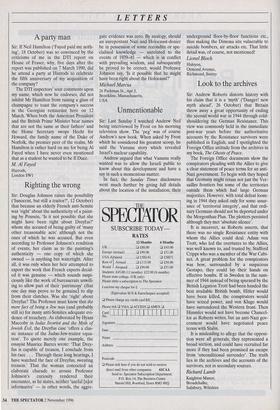Look to the archives
Sir: Andrew Roberts distorts history with his claim that it is a 'myth' (Danger! new myth ahead', 26 October) that Britain threw away a great opportunity of ending the second world war in 1944 through cold- shouldering the German Resistance. This view was commonly held in the immediate post-war years before the authoritative accounts by the Resistance survivors were published in English, and I spotlighted the Foreign Office attitude from the archives in my book, The Ghosts of Peace.
The Foreign Office documents show the conspirators pleading with the Allies to give a clear statement of peace terms for an anti- Nazi government. To begin with they hoped that Germany might retain not just the Ver- sailles frontiers but some of the territories outside them which had large German majorities. However, with total defeat loom- ing in 1944 they asked only for some assur- ance of 'territorial integrity', and that ordi- nary Germans should not be deported under the Morgenthau Plan. The plotters persisted although they met 'absolute silence'.
It is incorrect, as Roberts asserts, that there was no single Resistance entity with whom the Allies could deal. Adam von Trott, who led the overtures to the Allies, was well known to, and trusted by, Stafford Cripps who was a member of the War Cabi- net. A great problem for the conspirators was how, surrounded by a suspicious Gestapo, they could lay their hands on effective bombs. If in Sweden in the sum- mer of 1944 instead of being spurned by the British Legation Trott had been handed the best available British bomb, Hitler would have been killed, the conspirators would have seized power, and von Kluge would have surrendered the Western front. Then Hinunler would not have become Chancel- lor as Roberts writes, but an anti-Nazi gov- ernment would have negotiated peace terms with Stalin.
It is misleading to allege that the opposi- tion were all generals; they represented a broad section, and could have recruited far more if they had been promised an escape from 'unconditional surrender'. The truth lies in the archives and the accounts of the survivors, not in secondary sources.
Richard Lamb
Knighton Manor, Broadchalke, Salisbury, Wiltshire


















































































 Previous page
Previous page